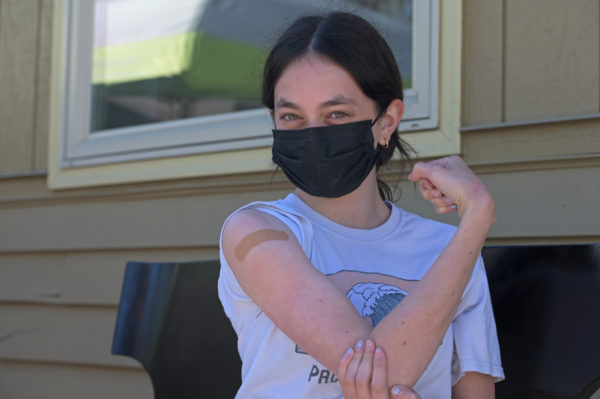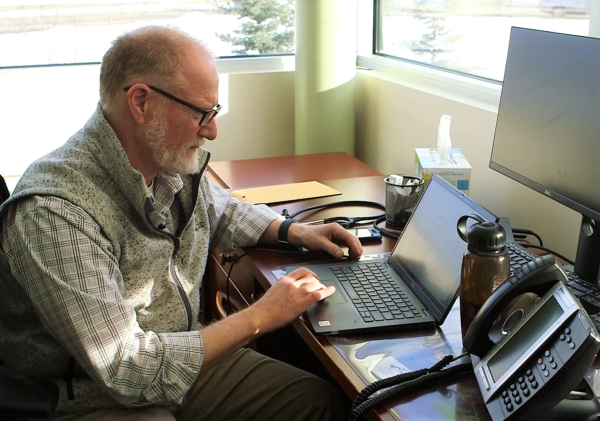
Vaccination rates for Alaska children lag far behind the rates for older kids and adults, according to data from the state health department.
In Alaska, only 25% of kids ages 5 to 11 had received at least one shot by mid-February. Nationally, 31% have.
Pediatricians in Anchorage say misinformation is a big problem as they work to help parents understand the vaccines are safe.
Dr. Kilian Schafer, a pediatrician at the Children’s Clinic, said he’s still getting a lot of the same questions from parents as he did in November, when the CDC authorized the vaccine for children from 5 to 11 years old. He said he tries to address parents’ concerns, and explain how getting kids vaccinated can help other family members.
“A lot of times, being able to travel, having family visit, being able to visit family — especially family that may have health problems — encourages parents to get their kids vaccinated,” he said.
He said some parents were quick to bring their kids to his office’s drive-through vaccination clinic back in November. But most parents are still hesitant, even if they’re vaccinated and boosted themselves.
“A lot of people like to consult Dr. Google,” he said. “That can cause a lot of problems because there’s a lot of misinformation.”
Much of that misinformation revolves around this being a new type of vaccine. It contains mRNA rather than a live virus, like the chickenpox vaccine does, or a dead virus, like flu shots do.
“They’re more than willing to get their kids vaccinated for all the prior childhood vaccines that have been available, but some are wanting to wait to see as far as this new vaccine is concerned,” Schafer said.
Dr. Jeff Brand is a pediatrician with LaTouche Pediatrics in Anchorage and Eagle River. Because parents are already confused about mRNA vaccines, he said, misinformation is that much more effective.

“I’ve had several parents, like, ‘I don’t want to give it to my daughter and have to tell her 20 years from now when she can’t have a baby it was from the vaccine,’” he said. “It doesn’t get into the ovaries, it doesn’t change your DNA.”
Brand often compares the COVID-19 vaccine to other vaccines, like for polio or measles. He said any negative side effects from a vaccine usually appear in a population within the first year.
“When the measles vaccine came out in the ‘60s, nobody knew what was going to happen one or two years later, and they didn’t wait until they were 35 to figure it out. No one said, ‘I think I’ll wait ‘til my kid’s 20 to find out if he really is going to get meningitis or if the Hib’s going to protect him. That’s what’s going on now, and I guess I don’t understand that,” he said. “I’ve been doing this since 1982. I’ve never seen a long-term side effect from a vaccine.”
One rare complication from vaccination in teens is myocarditis, which causes chest pain and other symptoms. But studies show that it’s extremely rare and usually subsides quickly. COVID-19 infections bring greater risks for heart problems like multisystem inflammatory syndrome than COVID vaccinations, according to researchers.
Omicron has brought up new questions, said Brand. He said some people are wondering why they should bother getting vaccinated at all, if they might get COVID anyway because omicron is so contagious. He said it’s important to recognize that while the vaccine isn’t 100% effective — and no vaccine is — it’s still protecting most people from getting hospitalized.
“Very early on, it was like, if we can get a vaccine that’s as effective as the flu vaccine, we’ll be happy,” he said. “But then we had two vaccines come out that are 90% effective at preventing death, at preventing hospitalizations. And people kind of got spoiled in the sense that, originally we were talking about, we want one as good as the flu, which is 40% effective.”
The FDA recently postponed its meeting with Pfizer on vaccines for kids under 5. In the meantime, Brand reminds parents to read trustworthy sources, avoid scientific studies that aren’t peer reviewed, and ask pediatricians about any concerns.
[Sign up for Alaska Public Media’s daily newsletter to get our top stories delivered to your inbox.]




